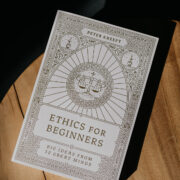It was a great joy to see the success of Word on Fire’s first Wonder Conference, and I anticipate the upcoming Terrence Malick-esque “Wonder” video series will be a great resource for teachers and catechists. But I wonder if many people know why “Wonder” was chosen as the title of a conference committed to addressing the relationship between faith and science?
About a year ago, Word on Fire was preparing for such an event, after it received a generous grant from the John Templeton Foundation. The Marketing team was brainstorming potential conference titles. From “Vitruvian Man” to simply “Faith and Science,” nothing clicked. Knowing my interest in the topic, one of my colleagues asked for my opinion. Around this time, I just finished an article on why I showed Terrence Malick movies in the classroom, one of which is entitled “To the Wonder” and I was reading Pierre Hadot’s The Veil of Isis: An Essay on the History of the Idea of Nature for a talk I was giving on the merits of a Goethean approach to the sciences, so I suggested “Wonder” as the title, giving him a short lecture on why such a term fits Word on Fire’s principles (such as leading with beauty) and is an appropriate way of getting at the right relationship between faith and science. My colleague seemed to agree, and that is how “Wonder” became the title of the conference.
Allow me to further explain the fittingness of the term “wonder” in this context. Sometimes people use the term “wonder” in a mocking way, as if it is lacking in the seriousness appropriate to science. This bothers me. I guess the thinking is that wonder is appropriate for a religious conference on the sciences but not for the serious business of scientists. American culture is rife with such thinking. But is such a cultural perspective unique to us? Perhaps not, but I think such a mentality has its deepest roots here. Pope Benedict XVI, like Pope Francis in Laudato Si, believed we live in a technological civilization in which humanity has lost the capacity to wonder, failing to sense what Abraham Heschel calls “the grandeur of what is eternal in time.” Such a culture blocks wonder, focusing almost exclusively on “productivity.” Such a technological civilization keeps us hunkered down, looking at nature through the representations of our devices, as if living in a concrete bunker instead of looking up and contemplating the grandeur all around.
Only through wonder can we properly receive the world.
In his book Ordering Love: Liberal Societies and the Memory of God, David L. Schindler urges the recovery of sensing the transcendent origin of things in a Creator. He sees this as being “formed in wonder.” And this, as I see it, is the most important task today, deeper than the so-called conflict between faith and science.
To illustrate his meaning and the cloud of the technological civilization under which we now live, Schindler quotes from Archbishop Kazimierz Majdanski’s book, You Shall Be My Witnesses: Lessons Beyond Dachau. Granted, Dachau is an extreme, but its two governing rules are found in society at large in that wonder is not encouraged. This is the instrumental world of the worker. In addition to the principle Arbeit mach frei, “Work sets one free,” Dachau had the rule Im Lager nur Laufschritt, “Only running (brisk walking) is permitted in camp.” “Productivity” was the aim. Majdanski recalls that “the snowy Alps were visible in the distance from the camp, but no one was able to muster it within himself to give any thought to how beautiful they really are; this can only be done by one who is able to look at the world with the eyes of a man, not a slave.”
Schindler notes that man was made to contemplate something like what T.S. Eliot means by the still point at the heart of the dance, the eternity at the heart of time, God in all things shining.
The Romantic movement of the nineteenth century, with Goethe as its most representative poet-scientist, attempted what Pierre Hadot calls an Orphean recovery of the sacredness of all things in reaction to the Promethean tendency in modern science—found most explicitly in the writings of Francis Bacon—that advocated an approach of science as power over nature. But far from being anti-Christian, Bacon saw the methods of science as offering a way of off-setting the effects of the fall. While Romanticism sometimes fell into pantheism in its reverence of nature, its advocacy of a patient, reverential approach to nature, waiting for her (Nature personified) to unveil her secrets, is closer to the wonder and awe with which Adam beheld Eve, the mother of all the living, in the Garden. Such an aesthetic gaze; imagine Adam looking into the iris of Eve (Iris—rainbow, messenger of heaven to the gods and daughter of Thaumus whose name Plato believes means “wonder,” see Theaetetus), is like the erotic, nuptial gaze of lovers as opposed to to the instrumentalist, domineering gaze advocated by early moderns. Such a “personalist” approach is popularly considered pseudo-scientific, perhaps literary, but many Nobel Prize winners think it is integral to the scientific endeavor.

For example, 1986 Nobel Prize winner for chemistry Dudley Herschbach, who jointly won the prize with John Polyani, son of the famous Michael Polyani author of Personal Knowledge: Towards a Post-Critical Philosophy, had his students write poetry before entering the lab because he thought it was a good exercise in patience and attending to the language of nature. A poet, in his view, does not so much write a poem as discover the poem which, in a way, has been there for a long time, waiting to be discovered in the proper language. Only through wonder can we properly receive the world.
My hope is that you will see that philosophy, specifically metaphysics, is at the heart of the relationship between faith and science. As Aristotle maintained in his Metaphysics 982 b 12 fi.:
It is owing to wonder that men both now begin, and at first began, to philosophize. They wondered . . . about the phenomena of the moon and those of the sun and the stars, and about the origin of the universe. And a man who is puzzled and wonders things himself ignorant. Hence, even the lover of myth in a sense is a lover of wisdom or a philosopher, for the myth, too, is composed of wonders. Therefore, since men philosophize in order to escape from ignorance, they were pursuing knowledge or science in order to know, and not for any utilitarian purpose. . . . Evidently, then, we do not seek this kind of knowledge for the sake of any other advantage. . . . We pursue it as the only free science, because it exists for its own sake.
I also hope the Wonder Conference and video series makes philosophers—“lovers of wisdom”—of us all. And let it return us to that childlike simplicity that finds a way into astrophysics with an old English lullaby like “Twinkle, twinkle, little star, how I wonder what you are.”
